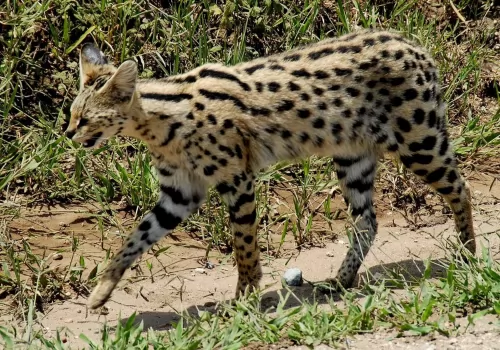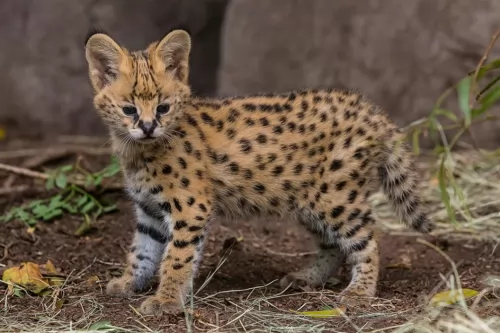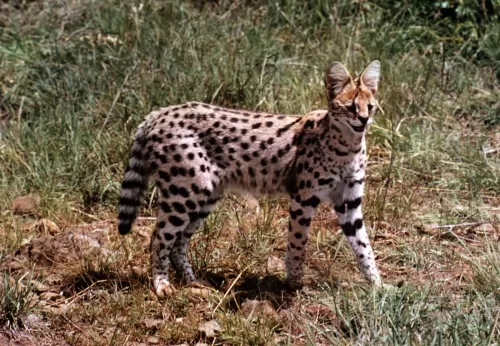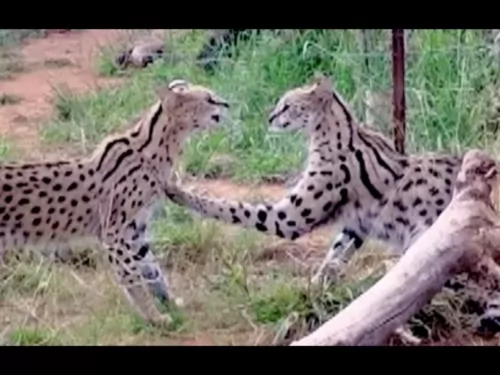African Serval is originated from South Africa but Stone Cougar is originated from Egypt. Both African Serval and Stone Cougar are having almost same weight. African Serval may live 4 years more than Stone Cougar. Both African Serval and Stone Cougar has same litter size. Both African Serval and Stone Cougar requires Low Maintenance.
Basic Information
undefined
South Africa
Egypt
Life Span:
12 - 20 Years
12 - 16 Years
Other Names:
None
Mountain Cougar, Chausie
Colors Available:
Spotted and striped with black against a golden/tawny shade
Light fawn color
Coat:
short
Short. coarse and thick
Temperament:
Affectionate, Aggressive, Alert, Cheerful, Courageous, Curious, Energetic, Friendly, Independent, Intelligent, Lively, Loving, Loyal, Outgoing, Playful, Responsive, Territorial
Affectionate, Alert, Cheerful, Curious, Energetic, Friendly, Independent, Intelligent, Lively, Loving, Loyal, Outgoing, Playful, Responsive, Social, Territorial
Grooming:
Low Maintenance
Low Maintenance
Trainability:
Moderate
Easy
New Owners Friendly:
No
Yes
History
 The African Serval is a wild cat that hails from Africa. You’ll see them on Africa’s savannas where there is tall grass and reeds, preferably near water.
The African Serval is a wild cat that hails from Africa. You’ll see them on Africa’s savannas where there is tall grass and reeds, preferably near water.
If you want to own a serval cat, you have to check whether you require licenses and permits as they are particularly difficult to rehome once you have owned one. Humans have kept them since ancient times, but they are not domesticated cats as such.
Breeding servals arrived in the United States many decades ago. Breeders have also crossed serval cats with domestic cats to produce hybrids, one of which is the Savannah cat.
Once again the Stone Cougar, also referred to as the Mountain Cougar or Chausie, is a cat that was developed to resemble a wild cat but that is actually a domestic cat.
The Stone Cougar is a rare domestic cat that is a cross between a domestic cat and the wild Jungle cat. It is referred to as a wildcat hybrid.
Description
 The Serval is a medium to large-sized cat that stands at between 54–62 cm in height and weighs in the region of 9–18 kg.
The Serval is a medium to large-sized cat that stands at between 54–62 cm in height and weighs in the region of 9–18 kg.
Some people think its a cat that looks similar to a Cheetah and this is because it also has a small head. It is known for its large ears which are black at the back with a large white dot. The attractively patterned coat is both spotted and striped with black against a golden/tawny shade.
These wild cats make a number of different noises - high pitched cries to growls, spitting sounds and purring. Another well-known feature with the cat is its particularly long legs. The tail has some black rings and it is black-tipped. The eyes of the Serval are a brown/greeny color.
The Serval cats will only come together for mating and then they resume their solitary lives. Gestation lasts for roughly 73 days after which up to 6 kittens can be born. In captivity, a Serval can live to be about 20 years of age.
Temperament:
The Serval is an active cat night and day. They are solitary animals not known for strong social interactions with humans but they can be playful with the few humans he gets to know.
People need to always know that owning a wild pet like this comes with risks. Not only that, a Serval wants to mark its territory and while you may provide a litter box, it's not to say he will use it.
They are able to bond with humans to some extent, more so if they were hand-fed from early on. They bond with one person and can form an affectionate relationship with that one person.
The Stone Cougar cat is thick-set with a thick tail. They are large cats too and can be anything between 7 and 13kg.
The ears are small. The color’ stone’ is used to describe the color of this cat – a light fawn color. These cats can be a lot bigger than your regular cat and they are also referred to as Mountain Cougar or Jungle Curl. Because they are bigger than most domestic cats, they can take up to 3 years to reach maturity.
Temperament:
This is an active cat that is intelligent and adventurous. People who have kept this social cat as a pet say that he is trainable and also dog-like and even enjoys playing in water.
Like many other hybrid cats, the Stone Cougar can have some endearing characteristics that tend to make it quite different from your regular cat.
Characteristics
 The African Serval is a wild animal and should be left in the wild.
The African Serval is a wild animal and should be left in the wild.
However, if you do decide to bring one into your home as a pet, they aren’t recommended for homes with young children or for a first-time pet owner.
Their play is rough and they like to use their teeth and claws during play. If the child gets hurt, then in typical unfair human fashion, the Serval is the one who suffers. They are capable of making good pets though but it is not recommended.
When it comes to bringing a Stone Cougar into your home, you need to be well prepared for such a large cat.
They are also very energetic and you may be overwhelmed by his darting around. It is why so many of these hybrids land up in shelters – people don’t believe that they are different from your regular domesticated cat.
Nonetheless, they can make loving pets and they like lots of attention too. Don’t just get a Stone Cougar because it is an exotic cat. Think carefully if you are ready to be totally devoted to the cat for 12 – 16 years possibly.
Health Problems
 Make sure that before you take in a Serval as a pet you have access to a good veterinarian who is experienced in helping exotic pets.
Make sure that before you take in a Serval as a pet you have access to a good veterinarian who is experienced in helping exotic pets.
Also, the African Serval, when domesticated, will need the same cat vaccines that you would give your regular kitten.
The Stone Cougar is a fairly healthy cat and you aren’t going to have to worry about heavy vet bills if you look after him well.
Remember that just like with humans, the health of a cat depends heavily on the food you give him. It needs to be high-quality food.
Obesity is something you want to always watch out for as it can bring on a host of ailments of which joint problems and arthritis are ones to look out for.
Caring The Pet
Diet:
 The Serval is a wild cat so in the wilds it eats prey such as frogs, birds and reptiles. They are known for leaping high into the air to catch prey but they will also burrow into holes to get prey out.
The Serval is a wild cat so in the wilds it eats prey such as frogs, birds and reptiles. They are known for leaping high into the air to catch prey but they will also burrow into holes to get prey out.
You should try to provide your Serval pet with some whole prey. Do research on the food of Servals because you will need to offer your wild pet a feline supplement. There are also formulated pelleted food, but this shouldn’t form the bulk of his food but rather be a supplement to his meats. Choose a variety of meats such as chicken, mice, turkey, beef, duck as well as rabbits and birds.
Space:
If you keep a serval, it is imperative that it has large outdoor areas to roam in. They’re nocturnal animals, so they become more active at night. They’re used to living near streams in the wild so some kind of pool will be required for him, possibly even a fish pond where he can catch his own fish.
The Stone Cougar is easy to take care of in terms of grooming as it has a short coat. You want to brush the short coat at least once a week to remove dust and loose hairs. It isn’t a heavy shedding cat.
Keep his nails short. Invest in a scratching post for him as all cats are natural scratchers.
As also mentioned, the Stone Cougar is a large cat and the correct diet is of the utmost importance. There are some cat owners who like to prepare their cat’s food, but then you just have to be 100% sure that he is getting in all the vital nutrients he requires for health.
The best, most high-quality commercial cat food manufacturers make sure that the cat food they manufacture is packed with everything a cat needs, with meat being the top ingredient. Remember, when in any kind of doubt with your Stone Cougar’s diet, rather speak to your vet.
The Stone Cougar is prone to food allergies, and it is for this reason that you will need to provide these cats with a high-quality diet.
Make sure you read the labels carefully because you want to avoid some of the junk additives added into some of the more inferior cat foods. They can often be prone to digestive issues.
The Stone Cougar is an active cat and he will need to be well exercised. Such a large cat will require en outside enclosure where he can run, jump and climb without fear of him getting out and running away.
If you don’t have an outdoor enclosure, the next best thing is to train him to walk on a leash.
Unless you intend to be breeding, be sure to spay or neuter your Stone Cougar.
Comparison with other breeds
- Stone Cougar vs Abyssinian - Breed Comparison
- Stone Cougar vs Aegean - Breed Comparison
- Stone Cougar vs African Serval - Breed Comparison
- Stone Cougar vs Chausie - Breed Comparison
- Stone Cougar vs American Bobtail - Breed Comparison
- Stone Cougar vs American Curl - Breed Comparison
- Stone Cougar vs American Keuda - Breed Comparison
- Stone Cougar vs American Longhair - Breed Comparison
- Stone Cougar vs American Polydactyl - Breed Comparison
- Stone Cougar vs American Shorthair - Breed Comparison
- Stone Cougar vs American Wirehair - Breed Comparison
- Stone Cougar vs Applehead Siamese - Breed Comparison
- Stone Cougar vs Ashera - Breed Comparison
- Stone Cougar vs Asian - Breed Comparison
- Stone Cougar vs Asian Semi-Longhair - Breed Comparison
- Stone Cougar vs Australian Mist - Breed Comparison
- Stone Cougar vs Balinese - Breed Comparison
- Stone Cougar vs Bengal - Breed Comparison
- Stone Cougar vs Bicolor - Breed Comparison
- Stone Cougar vs Birman - Breed Comparison
- Stone Cougar vs Blue Russian - Breed Comparison
- Stone Cougar vs Bombay - Breed Comparison
- Stone Cougar vs Brazilian Shorthair - Breed Comparison
- Stone Cougar vs Bristol - Breed Comparison
- Stone Cougar vs British Longhair - Breed Comparison
- African Serval vs Abyssinian - Breed Comparison
- African Serval vs Aegean - Breed Comparison
- Chausie vs African Serval - Breed Comparison
- American Bobtail vs African Serval - Breed Comparison
- American Curl vs African Serval - Breed Comparison
- American Keuda vs African Serval - Breed Comparison
- American Longhair vs African Serval - Breed Comparison
- American Polydactyl vs African Serval - Breed Comparison
- American Shorthair vs African Serval - Breed Comparison
- American Wirehair vs African Serval - Breed Comparison
- Applehead Siamese vs African Serval - Breed Comparison
- Ashera vs African Serval - Breed Comparison
- Asian vs African Serval - Breed Comparison
- Asian Semi-Longhair vs African Serval - Breed Comparison
- Australian Mist vs African Serval - Breed Comparison
- Balinese vs African Serval - Breed Comparison
- Bengal vs African Serval - Breed Comparison
- Bicolor vs African Serval - Breed Comparison
- Birman vs African Serval - Breed Comparison
- Blue Russian vs African Serval - Breed Comparison
- Bombay vs African Serval - Breed Comparison
- Brazilian Shorthair vs African Serval - Breed Comparison
- Bristol vs African Serval - Breed Comparison
- British Longhair vs African Serval - Breed Comparison
- British Shorthair vs African Serval - Breed Comparison
 Petzlover
Petzlover The African Serval is a wild cat that hails from Africa. You’ll see them on Africa’s savannas where there is tall grass and reeds, preferably near water.
The African Serval is a wild cat that hails from Africa. You’ll see them on Africa’s savannas where there is tall grass and reeds, preferably near water. The Serval is a medium to large-sized cat that stands at between 54–62 cm in height and weighs in the region of 9–18 kg.
The Serval is a medium to large-sized cat that stands at between 54–62 cm in height and weighs in the region of 9–18 kg. The African Serval is a wild animal and should be left in the wild.
The African Serval is a wild animal and should be left in the wild. The Serval is a wild cat so in the wilds it eats prey such as frogs, birds and reptiles. They are known for leaping high into the air to catch prey but they will also burrow into holes to get prey out.
The Serval is a wild cat so in the wilds it eats prey such as frogs, birds and reptiles. They are known for leaping high into the air to catch prey but they will also burrow into holes to get prey out.